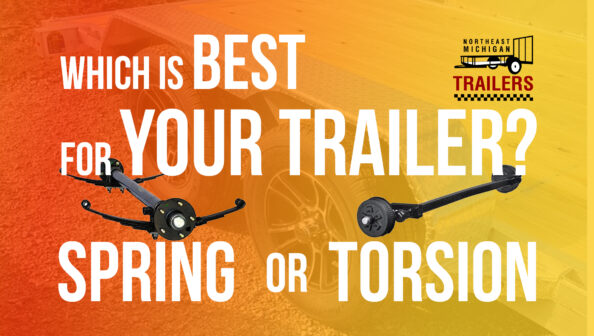
When selecting a trailer, a crucial decision involves choosing the right type of axle. Both spring axles and torsion axles offer distinct advantages and potential drawbacks that can influence your trailer’s performance, maintenance needs, and suitability for specific applications.
Understanding Spring Axles
What Are Spring Axles?
Spring axles use stacked metal leaf springs to support the trailer’s weight and absorb road shocks. This traditional suspension system is common in many trailers due to its straightforward design and cost-effectiveness.
Advantages of Spring Axles
-
Cost-Effectiveness: Manufacturers generally find spring axles less expensive to produce and install, offering a budget-friendly option for many trailer owners.
-
Ease of Maintenance and Repair: With components positioned externally, you can easily inspect and repair them. You can replace individual parts, such as leaf springs, without needing specialized equipment or welding.
-
High Load Capacity: Suitable for heavy-duty applications, spring axles can support substantial loads, making them ideal for utility and equipment trailers.
Disadvantages of Spring Axles
-
Rougher Ride Quality: Spring axles might provide a less smooth ride, especially when the trailer is unloaded, because of the rigid nature of leaf springs.
-
Susceptibility to Corrosion: In environments with high moisture, such as coastal areas, leaf springs can rust over time, which might reduce lifespan and performance.
Understanding Torsion Axles
What Are Torsion Axles?
Torsion axles incorporate a square tube that houses rubber cords, providing suspension through torsional resistance. This design allows for independent suspension for each wheel, contributing to a smoother towing experience.
Advantages of Torsion Axles
-
Smooth Ride Quality: The rubber torsion system effectively absorbs road shocks, offering a quieter and more comfortable towing experience.
-
Low Maintenance: With fewer moving parts and a sealed design, torsion axles require minimal maintenance compared to spring axles.
-
Corrosion Resistance: The enclosed construction and rubber components provide enhanced resistance to environmental factors, making torsion axles suitable for marine applications.
Disadvantages of Torsion Axles
-
Higher Initial Cost: Typically, torsion axles come at a higher upfront cost compared to spring axles, which may influence budget-conscious buyers.
-
Complex Repairs: If internal damage occurs, you might need to replace torsion axles completely, as internal components are not serviceable, potentially leading to higher repair costs.
Making the Right Choice: Spring vs. Torsion Axles
When to Choose Spring Axles:
-
Opt for spring axles if you seek a cost-effective solution for heavy-duty hauling.
-
Choose spring axles if your trailer operates primarily on smooth roads, where ride quality is less of an issue.
-
Select spring axles if ease of maintenance and readily available replacement parts are your priorities.
When to Choose Torsion Axles:
-
Opt for torsion axles if you prioritize a smooth and quiet towing experience, especially over long distances or uneven terrain.
-
Choose torsion axles if your trailer will face corrosive environments, such as marine settings.
-
Select torsion axles if you prefer a low-maintenance suspension system with enhanced durability.
At Northeast Michigan Trailers, we offer a diverse selection of trailers equipped with both types of axles to meet your specific requirements. Our experienced team is ready to help you choose the ideal trailer that aligns with your towing needs and preferences.
